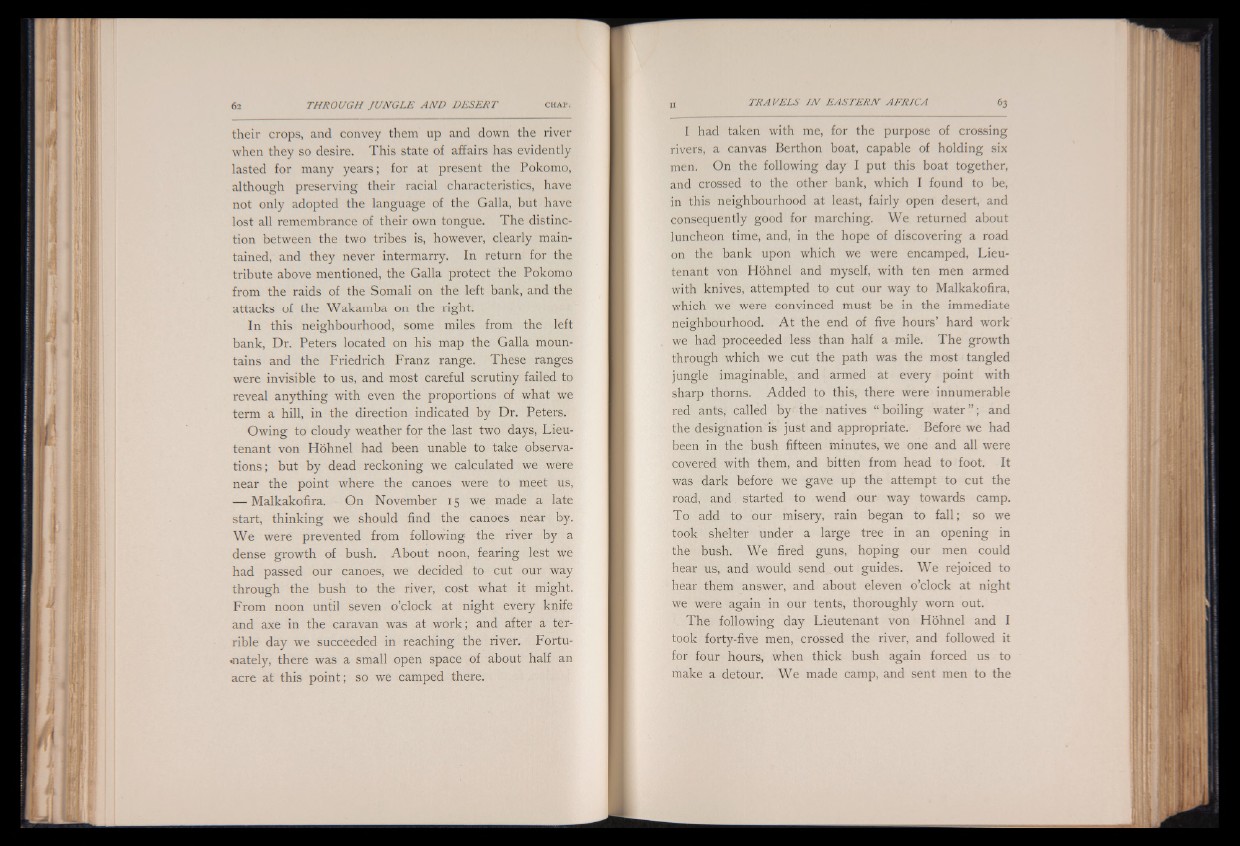
their crops, and convey them up and down the river
when they so desire. This state of affairs has evidently
lasted for many years; for at present the Pokomo,
although preserving their racial characteristics, have
not only adopted the language of the Galla, but have
lost all remembrance of their own tongue. The distinction
between the two tribes is, however, clearly maintained,
and they never intermarry. In return for the
tribute above mentioned, the Galla protect the Pokomo
from the raids of the Somali on the left bank, and the
attacks of the Wakamba on the right.
In this neighbourhood, some miles from the left
bank, Dr. Peters located on his map the Galla mountains
and the Friedrich Franz range. These ranges
were invisible to us, and most careful scrutiny failed to
reveal anything with even the proportions of what we
term a hill, in the direction indicated by Dr. Peters.
Owing to cloudy weather for the last two days, Lieutenant
von Hohnel had been unable to take observations
; but by dead reckoning we calculated we were
near the point where the canoes were to meet us,
— Malkakofira. On November 15 we made a late
start, thinking we should find the canoes near by.
We were prevented from following the river by a
dense growth of bush. About noon, fearing lest we
had passed our canoes, we decided to cut our way
through the bush to the river, cost what it might.
From noon until seven o’clock at night every knife
and axe in the caravan was at work; and after a terrible
day we succeeded in reaching the river. Fortunately,
there was a small open space of about half an
acre at this point; so we camped there.
I had taken with me, for the purpose of crossing
rivers, a canvas Berthon boat, capable of holding six
men. On the following day I put this boat together,
and crossed to the other bank, which I found to be,
in this neighbourhood at least, fairly open desert, and
consequently good for marching. We returned about
luncheon time, and, in the hope of discovering a road
on the bank upon which we were encamped, Lieutenant
von Hohnel and myself, with ten men armed
with knives, attempted to cut our way to Malkakofira,
which we were convinced must be in the immediate
neighbourhood. A t the end of five hours’ hard work
we had proceeded less than half a mile. The growth
through which we cut the path was the most tangled
jungle imaginable, and armed at every point with
sharp thorns. Added to this, there were innumerable
red ants, called by the natives “ boiling water ” ; and
the designation is just and appropriate. Before we had
been in the bush fifteen minutes, we one and all were
covered with them, and bitten from head to foot. It
was dark before we gave up the attempt to cut the
road, and started to wend our way towards camp.
To add to our misery, rain began to fall; so we
took shelter under a large tree in an opening in
the bush. We fired guns, hoping our men could
hear us, and would send out guides. We rejoiced to
hear them answer, and about eleven o’clock at night
we were again in our tents, thoroughly worn out.
The following day Lieutenant von Hohnel and I
took forty-five men, crossed the rivef, and followed it
for four hours, when thick bush again forced us to
make a detour. We made camp, and sent men to the